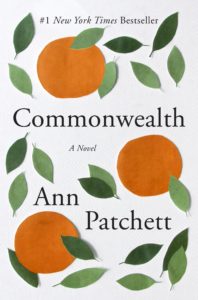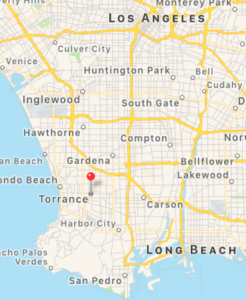Commonwealth
 The oranges on the cover of this book signify two watershed events inside. Oranges picked from the Keatings’ backyard trees, juiced and mixed with gin, make seductive drinks for their daughter Franny’s christening party. Franny’s mother, Beverly, who admits to being a little drunk, shares an orangey kiss with Bert Cousins, an uninvited guest looking for adventure. Cousins calls that kiss the “beginning of my life” and reaches to pick an orange from a high branch as he leaves the party. The parallel to the fruit of the tree of knowledge in Genesis is apt.
The oranges on the cover of this book signify two watershed events inside. Oranges picked from the Keatings’ backyard trees, juiced and mixed with gin, make seductive drinks for their daughter Franny’s christening party. Franny’s mother, Beverly, who admits to being a little drunk, shares an orangey kiss with Bert Cousins, an uninvited guest looking for adventure. Cousins calls that kiss the “beginning of my life” and reaches to pick an orange from a high branch as he leaves the party. The parallel to the fruit of the tree of knowledge in Genesis is apt.
Oranges are also connected with death. Cousins’ son Cal is stung by a bee among the orange trees in his own backyard and has a severe allergic reaction. Bert threatens to cut down all his orange trees, but he never does. Later at Bert’s parents’ farm in Virginia, Cal, 15, is again stung by a bee. With neither his inhaler nor his Benadryl handy, he dies all alone. That death haunts his mother Theresa, his brother Albee, his sisters Holly and Jeanette, his stepmother Beverly, and his step-sisters Caroline and Franny throughout their lives. Each remembers it differently and with some guilt. Cal’s father Bert, though, who was having yet another affair back home in Arlington, evaded his responsibility for making sure that Cal kept the necessary supplies with him at all times. None of the parental figures ever caught on that Cal had been using his Benadryl to put his little brother to sleep, so that the rest of the kids could have unimpeded fun.
Commonwealth has so many flashbacks that it’s difficult to keep six kids and their ages straight. By my reckoning, Cal Cousins, the oldest, was born in 1959, died in 1974; Franny Keating was born in 1964, her christening was a year later. Albee Cousins, the youngest, was born in December, 1965. The novel ends fifty years later in 2015, when their fathers, Fix Keating and Bert Cousins, are in their early 80s.
Having lived in two states officially designated as Commonwealths, Massachusetts and Virginia, (a title also held by Pennsylvania and Kentucky), I have always been curious about the term. The archaic meaning of commonwealth is “general good,” but one current definition is “any group of persons united by some common interest” which seems to apply to this novel of blended families. Are the Keatings and the Cousins truly sharing their wealth? I suspect that Bert Cousins takes more than his share. Eventually, the siblings, now middle-aged, take care of their parents. Prompted by Albee Cousins, Franny and Caroline Keating, accompanied by their father Fix, are able to get Theresa Cousins to the hospital before she dies. Later, Franny, escaping the tensions of her mother’s third husband’s family, visits a grateful Bert in Arlington.
 I loved reading a novel set in the familiar environs of Arlington, Charlottesville, and rural Virginia, and being introduced to the orange orchards of Torrance, California. But my favorite setting was the bar of the Palmer House in Chicago, where Franny (an avid reader recalling Salinger’s heroine in Franny & Zooey) meets novelist Leon Posen. I learned how waitresses and bartenders divide duties and tips and how they cope with listening to an endlessly repeating mix tape. Like her mother, Franny is plucked from obscurity by this older stranger and swept into an affair. Franny’s stories about her family inspire Posen, after a long writer’s block, to produce a prize-winning bestseller named Commonwealth. Readers get a book within a book and glimpses of the high life of literary agents, actresses, and hangers-on. Family members are not amused to encounter themselves in the resulting movie twenty years later.
I loved reading a novel set in the familiar environs of Arlington, Charlottesville, and rural Virginia, and being introduced to the orange orchards of Torrance, California. But my favorite setting was the bar of the Palmer House in Chicago, where Franny (an avid reader recalling Salinger’s heroine in Franny & Zooey) meets novelist Leon Posen. I learned how waitresses and bartenders divide duties and tips and how they cope with listening to an endlessly repeating mix tape. Like her mother, Franny is plucked from obscurity by this older stranger and swept into an affair. Franny’s stories about her family inspire Posen, after a long writer’s block, to produce a prize-winning bestseller named Commonwealth. Readers get a book within a book and glimpses of the high life of literary agents, actresses, and hangers-on. Family members are not amused to encounter themselves in the resulting movie twenty years later.
Law is a theme in the book. Fix Keating is a cop; Bert Cousins, a Deputy District Attorney. Fix tries to become a lawyer himself, like the man who stole his wife, but after three failures, he gives up on passing the California bar. He sends each of his young daughters Kaplan’s Guide to the LSAT for Christmas. Daughter Franny later drops out of law school, while her sister Caroline becomes an intellectual property lawyer in Silicon Valley.
Reading this book made my family seem tame and normal, but I appreciated Patchett’s focus on how stories are passed down from generation to generation. After all, one of the objectives of this blog is to facilitate sharing family stories. What have been our “oranges,” our watershed events? The sudden deaths of Steve’s father Wayne and his sister Karen had strong impacts, as did the more-expected deaths of my parents, my brother Harry, and Steve’s mother Marie. For sunnier “oranges,” I take pride in our five beautiful grandchildren and in seven adults who have earned master’s degrees from 1968 – 2010. Dear family and friends: we are fortunate to share a commonwealth of reading and lifelong learning.
Leave a Reply